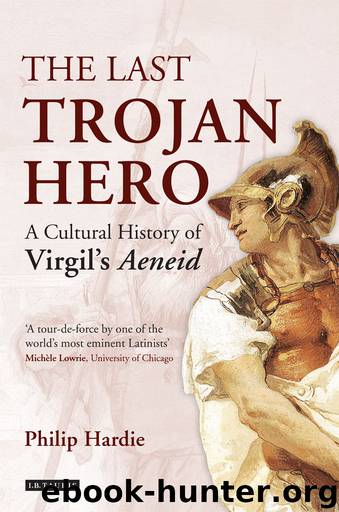The Last Trojan Hero by Philip Hardie

Author:Philip Hardie [Hardie, Philip]
Language: eng
Format: epub
ISBN: 9780857735065
Publisher: I.B.Tauris
A late example of Virgilianizing Stuart panegyric is Alexander Pope’s Windsor-Forest, published in March 1713 to celebrate the imminent Peace of Utrecht, and more generally trumpeting the age of peace of the Stuart queen Anne, who by a quasi-divine fiat (‘Let Discord cease!’) has brought an end to the catalogue of plague (1665), fire (1666) and ‘intestine wars’ viewed as punishment for the execution of Charles I. ‘Peace and plenty tell, a Stuart reigns’ (42). Pope will have been aware that in 1607 the first Stuart, James I, set out his vision of an age of ‘peace, plenty, love’, to be achieved through the union of England and Scotland, a union which was finally realized a hundred years later in 1707 when another Stuart, Queen Anne, gave the royal assent to the Act of Union.
In Windsor-Forest ‘Pope drew upon a particularly rich and various background of both classical and native materials […] Like the England it celebrates, the poem is sustained by a rich and far-flung commerce.’35 Permeating the whole is a series of Virgilian allusions and structures that draws on all three of Virgil’s major works, so acknowledging the far-reaching strands of continuity that tie together the three different genres, pastoral (Eclogues), agricultural-didactic (Georgics) and epic (Aeneid) (see Chapter 1, p. 3). This Virgilian underpinning gives the lie to an earlier critical commonplace that the poem falls into two ill-coordinated parts, a first portion (to line 290) that is essentially a juvenile work of ‘pastoral simplicity’, to which, in 1712, Pope attached a piece of Tory political propaganda. The poem starts in pastoral ‘forests’, but these are the green retreats of Windsor, seat of kings: ‘At once the monarch’s and the Muse’s seats’ (2), so suggesting the combination of lofty deeds and poetic-pastoral retreat that characterizes Virgil’s fourth and fifth Eclogues. This specimen of ‘local poetry’, for which Denham’s Cooper’s Hill (1642) is the dominant model in English literature, gravitates, in terms of the Virgilian models, above all to the Georgics, in its celebration of present-day agricultural plenty against the backdrop of a long view of the vicissitudes of history, culminating in the urban prosperity and world-wide empire, in this case mercantile rather than military, of Queen Anne’s new age of peace and prosperity, whose capital London is referred to as ‘Augusta’, suggesting a new Augustan age.
Download
This site does not store any files on its server. We only index and link to content provided by other sites. Please contact the content providers to delete copyright contents if any and email us, we'll remove relevant links or contents immediately.
The Hating Game by Sally Thorne(19217)
The Universe of Us by Lang Leav(15061)
Sad Girls by Lang Leav(14399)
The Lover by Duras Marguerite(7888)
The Rosie Project by Graeme Simsion(6367)
Smoke & Mirrors by Michael Faudet(6180)
Big Little Lies by Liane Moriarty(5782)
The Shadow Of The Wind by Carlos Ruiz Zafón(5680)
The Poppy War by R. F. Kuang(5676)
An Echo of Things to Come by James Islington(4843)
Memories by Lang Leav(4791)
What Alice Forgot by Liane Moriarty(4622)
From Sand and Ash by Amy Harmon(4495)
The Poetry of Pablo Neruda by Pablo Neruda(4088)
The Tattooist of Auschwitz by Heather Morris(3836)
Ficciones by Jorge Luis Borges(3622)
Guild Hunters Novels 1-4 by Nalini Singh(3460)
The Rosie Effect by Graeme Simsion(3457)
THE ONE YOU CANNOT HAVE by Shenoy Preeti(3363)
